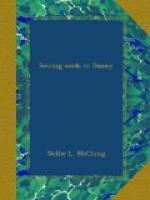“What was the trouble?” he asked quickly.
The young doctor told him, giving him such a thoroughly scientific history of the case that the old doctor’s opinion of him underwent a radical change. The young doctor explained briefly what he had attempted to do by the operation; the regular breathing and apparently normal temperature of the patient was, to the old doctor, sufficient proof of its success.
He stooped suddenly to examine the dressing that the young doctor was showing him, but his face twitched with some strong emotion—pride, professional jealousy, hatred were breaking down before a stronger and a worthier feeling.
He turned abruptly and grasped the young doctor’s hand.
“Clay!” he cried, “it was a great piece of work, here, alone, and by lamplight. You are a brave man, and I honour you.” Then his voice broke. “I’d give every day of my miserable life to be able to do this once more, just once, but I haven’t the nerve, Clay”; the hand that the young doctor held trembled. “I haven’t the nerve. I’ve been going on a whiskey nerve too long.”
“Dr. Barner,” the young man replied, as he returned the other’s grasp, “I thank you for your good words, but I wasn’t alone when I did it. The bravest little girl in all the world was here and shamed me out of my weakness and,” he added reverently, “I think God Himself steadied my hand.”
The old man looked up wondering.
“I believe you, Clay,” he said simply.
Tom went straight to his mother that morning and told her everything—the party he had gone to, his discontent, his desire for company and fun, and excitement, taking the money, and the events of the previous night.
Mrs. Motherwell saw her boy in a new light as she listened, and Tom had a glorified vision of his mother as she clasped him in her arms crying: “It is our fault Tom, mine and your father’s; we have tried to make you into a machine like we are ourselves, and forgot that you had a soul, but it’s not too late yet, Tom. I hate the money, too, if it’s only to be hoarded up; the money we sent to Polly’s mother has given me more pleasure than all the rest that we have.”
“Mother,” Tom said, “how do you suppose that money happened to be in that overcoat pocket?”
“I don’t know,” she answered; “your father must have left it there when he wore it last. It looks as if the devil himself put it there to tempt you, Tom.”
When his father came back from Winnipeg, Tom made to him a full confession as he had to his mother; and was surprised to find that his father had for him not one word of reproach. Since sending the money to Polly’s mother Sam had found a little of the blessedness of giving, and it had changed his way of looking at things, in some measure at least. He had made up his mind to give the money back to the church, and now when he found that it had gone, and gone in such a way, he felt vaguely that it was a punishment for his own meanness, and in a small measure, at least, he was grateful that no worse evil had resulted from it.




